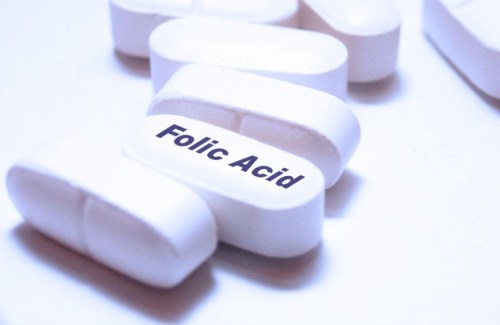Folic acid, Folate, or vitamin B9, is a member of the vitamin B group. Naturally, folic acid is found in beans, peas, lentils, beets, broccoli, spinach, sprouts and liver. It has astonishing effects for both treatment and prevention of megaloplastic anemia. The megaloplastic anemia is very dependent on the folic acid/folate deficiency. That’s the point why many legumes and dark green vegetables are said to help treat megaloplastic anemia. Symptoms of folic acid deficiency include fatigue, growth problems and mouth sores. Megaloplastic anemia symptoms are persistent fatigue, pale skin, lethargy, irritability and diarrhea.
Physiologically, folic acid has a substantial role in some amino acids conversions and metabolism. Also, it is essential for DNA synthesis and production of red blood cells. After eating folate-containing food, it’s promptly absorbed from the proximal part of the small intestine. Folic acid is then distributed to all body tissues. Thereafter, stored in liver and concentrated actively in the cerebrospinal fluid.
P.S. Cerebrospinal fluid is a colorless fluid present in the brain and spine. It’s significance is mainly mechanical and immunological.
■ Check out: The 14 Amazing Peppers Health Benefits
Folic acid Medication
The folic acid medication is used in general as a dietary supplement. Its daily required intake ranges from 150 to 200 micro-grams. The medicament is used for treatment and prophylaxis against the folic acid deficiency, thus megaloplastic anemia. Folic acid medication is highly recommended to be used along with vitamin B12 in cases of pernicious anemia. The combination is capable of correcting and avoiding the deterioration associated with the neurological symptoms.
Folic acid for Pregnancy
Folate deficiency may occur during pregnancy and lactation. Megaloplastic anemia could occur in turn as a consequence. So, 3 months before pregnancy, the dose must be increased. During the first trimester and for lactating mothers, the dose is increased to 400 micro-grams. This increase is important to avoid megaloplastic anemia and neutral tube defects as well.
Precautions before taking Folic acid
Folic acid medication should be taken merely according to the doctor recommendation. The patient should not take it if alcoholic, allergic to folic acid, has infection or kidney disease. Moreover, not taken if having any type of anemia like the hemolytic or pernicious. Also, if the anemia has not been diagnosed. Consult and inform your doctor about your eating habits and any medications or supplements you take.
Here are some of the medications with which, the folic acid medication may interact:
- Methotrexate
- Nitrofurantoin
- Phenytoin
- Primidone
- Barbiturate as Phenobarbital or Pentobarbital
Side effects of Folic acid
Folic acid can be well tolerated in general. However, in large doses, some symptoms of GIT upset may occur. The most commonly occurring side effects include,
- Nausea
- Flatulence
- Sleeping problems
- Irritability; Anxiety
For other side effects, never hesitate to call your doctor! If taken in overdose, some symptoms may occur such as numbness, tingling, mouth or tongue pain and weakness.


